 Petzlover
Petzlover Cardigan Welsh Corgi is originated from United Kingdom but German Shorthaired Pointer is originated from Germany. Cardigan Welsh Corgi may grow 30 cm / 11 inches shorter than German Shorthaired Pointer. Cardigan Welsh Corgi may weigh 18 kg / 39 pounds lesser than German Shorthaired Pointer. Both Cardigan Welsh Corgi and German Shorthaired Pointer has almost same life span. Cardigan Welsh Corgi may have less litter size than German Shorthaired Pointer. Both Cardigan Welsh Corgi and German Shorthaired Pointer requires Low Maintenance.
Cardigan Welsh Corgi is originated from United Kingdom but German Shorthaired Pointer is originated from Germany. Cardigan Welsh Corgi may grow 30 cm / 11 inches shorter than German Shorthaired Pointer. Cardigan Welsh Corgi may weigh 18 kg / 39 pounds lesser than German Shorthaired Pointer. Both Cardigan Welsh Corgi and German Shorthaired Pointer has almost same life span. Cardigan Welsh Corgi may have less litter size than German Shorthaired Pointer. Both Cardigan Welsh Corgi and German Shorthaired Pointer requires Low Maintenance.
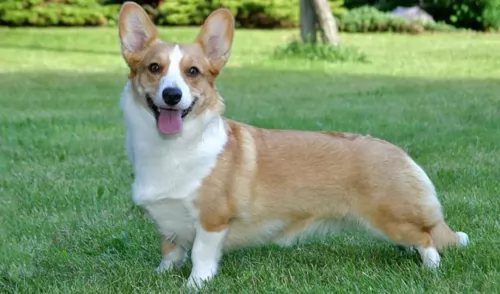 The Cardigan Welsh Corgi, named after Cardiganshire, Wales, is an ancient breed, brought to Wales by the Celts about 3,000 years ago.
The Cardigan Welsh Corgi, named after Cardiganshire, Wales, is an ancient breed, brought to Wales by the Celts about 3,000 years ago.
Small but tough, the Cardigan used to take part in cattle drives and his duties extended to protecting them at night.
The first pair of breeding Cardigans arrived in the United States in June 1931. The AKC granted full recognition to the breed four years later.The Cardi, as the breed is commonly called, was developed as an all-around farm dog in Wales. It is believed to be a descendant of the Pomeranian, Schipperkes, Keeshond and Swedish Valhund.
The Cardigan and the Pembroke Welsh corgis were separated officially into different breeds in the early 1930s. AKC recognition came in 1935.
 Being a member of the Sporting Group, the German Shorthaired Pointer is a dog which was developed in the 19th century in Germany, and specifically for hunting. Hunters wanted a dog who could hunt all types of game and in all types of terrain.
Being a member of the Sporting Group, the German Shorthaired Pointer is a dog which was developed in the 19th century in Germany, and specifically for hunting. Hunters wanted a dog who could hunt all types of game and in all types of terrain.
There are quite a few different theories that exist regarding the origin of the German Shorthaired Pointer, but most experts believe that the breed came from a mix of old Spanish pointer and traditional continental pointers with further crossings of German Bloodhound and French Gascon to enhance scenting abilities.
The dogs popularity flourished in Europe and in 1891 the Klub Kurzhaar was founded to maintain the guidelines for this new and beautiful sporting dog.
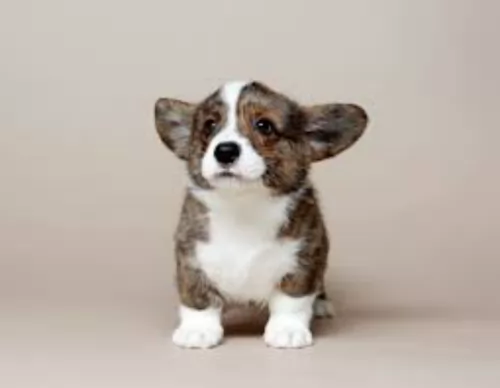 The long-shaped Cardiganshire Welsh Corgi is also nicknamed the ‘yard-long dog’ in Wales. Don’t be fooled by this low-to-the-ground dog, because when you look at him he isn’t a small dog at all, looking almost like a German shepherd with short legs, upright ears and a long, bushy tail.This is unlike the Pembroke Welsh Corgi whose tail is traditionally docked.
The long-shaped Cardiganshire Welsh Corgi is also nicknamed the ‘yard-long dog’ in Wales. Don’t be fooled by this low-to-the-ground dog, because when you look at him he isn’t a small dog at all, looking almost like a German shepherd with short legs, upright ears and a long, bushy tail.This is unlike the Pembroke Welsh Corgi whose tail is traditionally docked.
The Cardi stands around 270 to 330mm tall at the withers and weighs between 11 to 17kg. With those short legs he can gather up quite a speed as well. The dog has a double coat in fawn, red, black and with the outer coat being of medium length and quite harsh to the touch. You can also find some white on the neck, chest as well as on the legs.
The Cardigan Welsh Corgi is full of spirit and makes a fantastic companion for someone looking for a fun-loving, devoted friend. He is an easy going dog, making a wonderful pet, while being reserved with strangers. He isn’t a tall dog but he will guard the family too. He is good with children in the family and even with other pets, provided he is trained and socialized.
 Athletic, muscular and sleek, the medium to large sized German Shorthaired Pointer is at home on land and water. He stands between 53 to 63cm in height and weighs roughly between 20 – 32kg.
Athletic, muscular and sleek, the medium to large sized German Shorthaired Pointer is at home on land and water. He stands between 53 to 63cm in height and weighs roughly between 20 – 32kg.
The eyes are brown, the ears are fairly long, they are floppy and set high on the head. The tail is always docked to a particular length and is held straight out from the body so that it actually forms a line with the entire body and the head.
The dog has a short coat which is essentially a combination of liver and white speckles or dappling.
A whole lot of factors come into play when looking at the temperament of a dog. The kind of owners the dog has can have a huge affect on the way he turns out. Nonetheless every dog, including the German Shorthaired Pointer will require training and socialization to become obedient and relaxed around strangers and other pets.
The German Shorthaired Pointer is an intelligent, confident, bold, affectionate dog that wants to please his owners and he is easy to train. He is good with children too, just loving all interaction with his human family.
He is an energetic dog and will require plenty of exercising to avoid him becoming bored, frustrated and destructive.
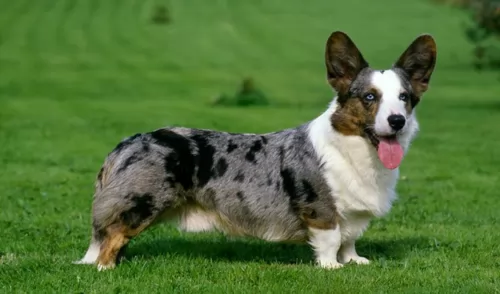 The Cardigan Welsh Corgi is full of surprises and he has been a strong working job, being quick and agile around cattle. He is good at everything and with training and socialization he is going to make an excellent pet.
The Cardigan Welsh Corgi is full of surprises and he has been a strong working job, being quick and agile around cattle. He is good at everything and with training and socialization he is going to make an excellent pet.
They are good with children and other pets and he makes an excellent guard dog as well. He is strong willed and feisty but he wants to please his owner. With a dog like this in your life, you’re going to have a faithful and loving friend who knows how to entertain you as well with his antics.
 As an intelligent hunting dog, the German Shorthaired Pointer is also a loving family companion and he just loves spending time outdoors with his human family.
As an intelligent hunting dog, the German Shorthaired Pointer is also a loving family companion and he just loves spending time outdoors with his human family.
He is pretty much an all-rounder – playful, energetic, a good watchdog and a loving and devoted family friend.
For an active, outdoor kind of family, include the German Shorthaired Pointer in all your activities and you’re going to ensure that you have a most wonderful 4-legged friend.
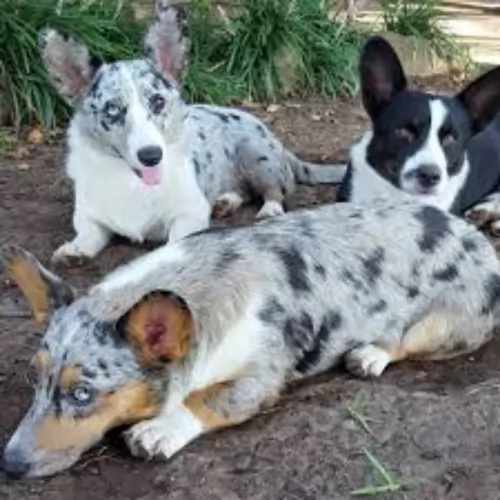 The Cardigan Welsh Corgi is a generally healthy breed with an average lifespan of 12-15 years. Like all dogs, they will have some health concerns, and recognizing the symptoms of some common dog illnesses can spare your pet.
The Cardigan Welsh Corgi is a generally healthy breed with an average lifespan of 12-15 years. Like all dogs, they will have some health concerns, and recognizing the symptoms of some common dog illnesses can spare your pet.
This is a debilitating genetic joint condition that can affects any dog really. It occurs when the hind leg joint isn’t held properly by the hip socket. Bone is worn away and your dog can experience severe pain.
Unfortunately this is a common skeletal disorder and your pet will be reluctant to jump or play. Untreated, it can lead to arthritis and chronic pain, making him immobile. There are several types of treatments and you want to get your pet to the vet to relieve him of pain and discomfort.
This is a terrible disease for your pet because the rear legs can actually become paralyzed and your pet won’t be able to control their bowels. It is an inflammatory autoimmune disease where the dog’s immune system cells attack the spinal cord sheath. If your vet suspects Degenerative Myelopathy, a blood sample will be required. Sometimes the dog has to be mercifully euthanized. Sometimes people even turn to holistic treatments to avoid this and help their pet.
 Most German Shorthaired Pointers are healthy dogs, but even so, just like with any other dog breed, they can be subject to some hereditary disorders as well as some of the other common dog illnesses there are -
Most German Shorthaired Pointers are healthy dogs, but even so, just like with any other dog breed, they can be subject to some hereditary disorders as well as some of the other common dog illnesses there are -
Dogs are such devoted family members that you just want to give in to them and pop the chocolate treats you love into their mouths. But dog’s can’t eat chocolate! Just one piece can affect a small dog. Symptoms of chocolate poisoning include diarrhea,vomiting, panting and shaking and even worse, a heart attack. If your dog has got hold of some chocolate, get him to the vet immediately.
Your German Shorthaired Pointer, as a puppy, should have his puppy vaccines. If your dog has this terrible disease, he will be lethargic, have diarrhea and almost seem out of it. Survival isn’t always guaranteed and the best way to avoid this killer disease, is to ensure your puppies vaccinations are up to date.
Check your pet for Bloat or an enlarged stomach which can twist because of trapped gas. This can be deadly for your pet. Get him immediately to the vet. He’ll be restless, lethargic and trying to vomit.
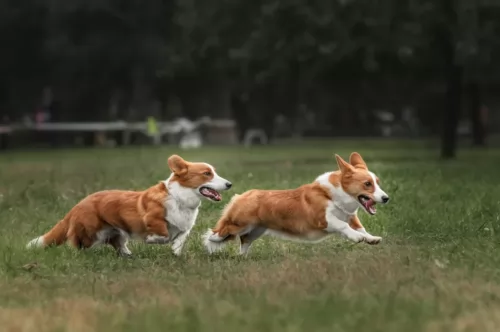 Cardigan Welsh corgis are active dogs and he is going to need daily exercise. He’ll love a walk with you and will show you how agile he is when you throw a ball for him
Cardigan Welsh corgis are active dogs and he is going to need daily exercise. He’ll love a walk with you and will show you how agile he is when you throw a ball for him
The Cardigan is a low maintenance dog. His thick double coat does shed quite a bit but nonetheless it is easy to maintain. Simply give it a good brush to remove loose hairs and to get rid of dirt. This brushing distributes the dogs natural oils and helps to keep the coat shiny and healthy.
 The German Shorthaired Pointer isn’t a heavy shedder. He has a short coat which requires brushing at least twice a week to remove loose hairs and keep it shiny and sleek.
The German Shorthaired Pointer isn’t a heavy shedder. He has a short coat which requires brushing at least twice a week to remove loose hairs and keep it shiny and sleek.
Also check in- and outside the ears, clip his nails and brush his teeth 2 or 3 times a week.
Only the highest grade kibble will do. Mix in some of your own home-made cooked brown rice, vegetables and chicken from time to time and also ensure your pet gets in some raw meat as well. Cool, fresh water should be constantly available.